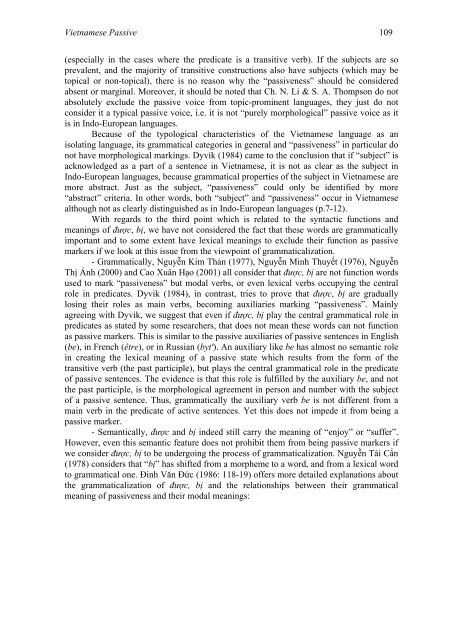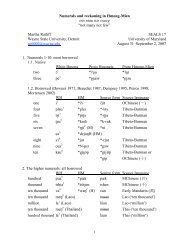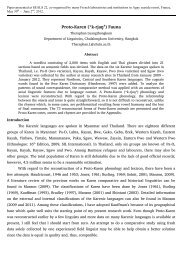proto-southwestern-tai revised: a new reconstruction - seals 22
proto-southwestern-tai revised: a new reconstruction - seals 22
proto-southwestern-tai revised: a new reconstruction - seals 22
Create successful ePaper yourself
Turn your PDF publications into a flip-book with our unique Google optimized e-Paper software.
Vietnamese Passive 109<br />
(especially in the cases where the predicate is a transitive verb). If the subjects are so<br />
prevalent, and the majority of transitive constructions also have subjects (which may be<br />
topical or non-topical), there is no reason why the “passiveness” should be considered<br />
absent or marginal. Moreover, it should be noted that Ch. N. Li & S. A. Thompson do not<br />
absolutely exclude the passive voice from topic-prominent languages, they just do not<br />
consider it a typical passive voice, i.e. it is not “purely morphological” passive voice as it<br />
is in Indo-European languages.<br />
Because of the typological characteristics of the Vietnamese language as an<br />
isolating language, its grammatical categories in general and “passiveness” in particular do<br />
not have morphological markings. Dyvik (1984) came to the conclusion that if “subject” is<br />
acknowledged as a part of a sentence in Vietnamese, it is not as clear as the subject in<br />
Indo-European languages, because grammatical properties of the subject in Vietnamese are<br />
more abstract. Just as the subject, “passiveness” could only be identified by more<br />
“abstract” criteria. In other words, both “subject” and “passiveness” occur in Vietnamese<br />
although not as clearly distinguished as in Indo-European languages (p.7-12).<br />
With regards to the third point which is related to the syntactic functions and<br />
meanings of được, bị, we have not considered the fact that these words are grammatically<br />
important and to some extent have lexical meanings to exclude their function as passive<br />
markers if we look at this issue from the viewpoint of grammaticalization.<br />
- Grammatically, Nguyễn Kim Thản (1977), Nguyễn Minh Thuyết (1976), Nguyễn<br />
Thị Ảnh (2000) and Cao Xuân Hạo (2001) all consider that được, bị are not function words<br />
used to mark “passiveness” but modal verbs, or even lexical verbs occupying the central<br />
role in predicates. Dyvik (1984), in contrast, tries to prove that được, bị are gradually<br />
losing their roles as main verbs, becoming auxiliaries marking “passiveness”. Mainly<br />
agreeing with Dyvik, we suggest that even if được, bị play the central grammatical role in<br />
predicates as stated by some researchers, that does not mean these words can not function<br />
as passive markers. This is similar to the passive auxiliaries of passive sentences in English<br />
(be), in French (être), or in Russian (byt'). An auxiliary like be has almost no semantic role<br />
in creating the lexical meaning of a passive state which results from the form of the<br />
transitive verb (the past participle), but plays the central grammatical role in the predicate<br />
of passive sentences. The evidence is that this role is fulfilled by the auxiliary be, and not<br />
the past participle, is the morphological agreement in person and number with the subject<br />
of a passive sentence. Thus, grammatically the auxiliary verb be is not different from a<br />
main verb in the predicate of active sentences. Yet this does not impede it from being a<br />
passive marker.<br />
- Semantically, được and bị indeed still carry the meaning of “enjoy” or “suffer”.<br />
However, even this semantic feature does not prohibit them from being passive markers if<br />
we consider được, bị to be undergoing the process of grammaticalization. Nguyễn Tài Cẩn<br />
(1978) considers that “bị” has shifted from a morpheme to a word, and from a lexical word<br />
to grammatical one. Đinh Văn Đức (1986: 118-19) offers more de<strong>tai</strong>led explanations about<br />
the grammaticalization of được, bị and the relationships between their grammatical<br />
meaning of passiveness and their modal meanings:





